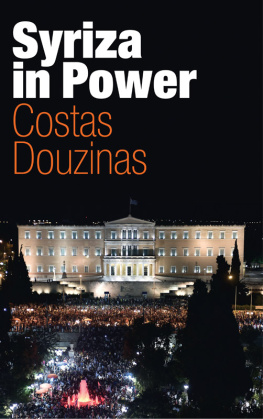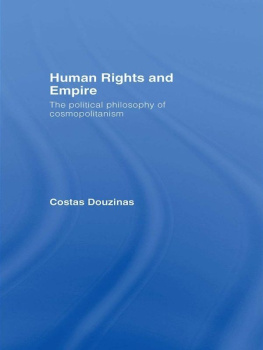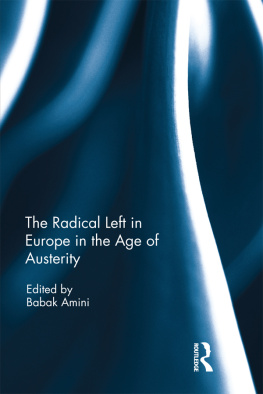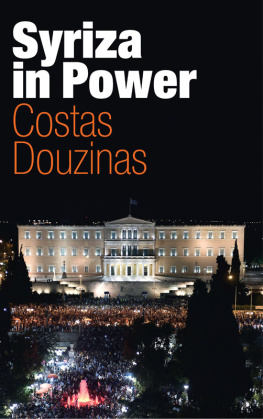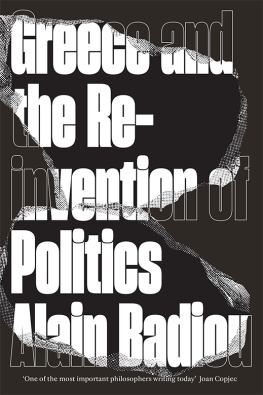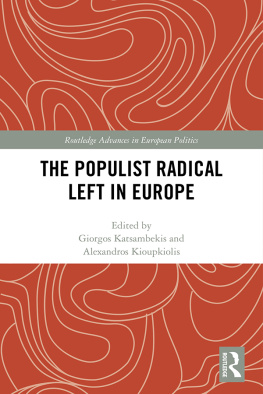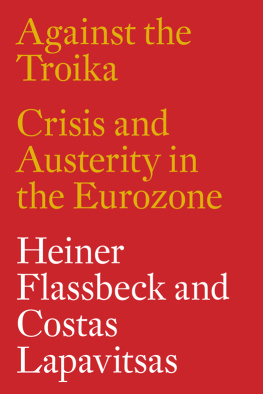
Dedication
To Joanna
and
Phaedra
Copyright page
Copyright Costas Douzinas 2017
The right of Costas Douzinas to be identified as Author of this Work has been asserted in accordance with the UK Copyright, Designs and Patents Act 1988.
First published in 2017 by Polity Press
Polity Press
65 Bridge Street
Cambridge CB2 1UR, UK
Polity Press
101 Station Landing
Suite 300,
Medford, MA 02155
USA
All rights reserved. Except for the quotation of short passages for the purpose of criticism and review, no part of this publication may be reproduced, stored in a retrieval system or transmitted, in any form or by any means, electronic, mechanical, photocopying, recording or otherwise, without the prior permission of the publisher.
ISBN-13: 978-1-5095-1157-0 (hardback)
ISBN-13: 978-1-5095-1158-7 (paperback)
A catalogue record for this book is available from the British Library.
Typeset in 10.5 on 12 pt Sabon by Toppan Best-set Premedia Limited
Printed and bound in the UK by CPI Group (UK) Ltd, Croydon
The publisher has used its best endeavours to ensure that the URLs for external websites referred to in this book are correct and active at the time of going to press. However, the publisher has no responsibility for the websites and can make no guarantee that a site will remain live or that the content is or will remain appropriate.
Every effort has been made to trace all copyright holders, but if any have been inadvertently overlooked the publisher will be pleased to include any necessary credits in any subsequent reprint or edition.
For further information on Polity, visit our website: politybooks.com
Prologue: The Accidental Politician
I was elected a Syriza Member of Parliament on 20 September 2015. I had not planned it, I did not want it, the idea had not even crossed my mind. I had lived in London since 1974. All my adult life and career had been spent in the protected and until recently gentle environment of British universities. In 1992, I had the great fortune to be appointed with Peter Goodrich to set up a Law School at Birkbeck College, the radical part of the University of London. Over twenty years, the School moved from three to thirty members of staff and acquired a reputation as the headquarters of Critical Legal Studies (CLS), a movement of radical academics and lawyers. The movement had started in the United States but has flourished in Britain. Its annual conference has been taking place every first weekend of September for some thirty years. On 5 September 2015, at the annual Critical Legal Conference at the University of Wroclaw, Poland my life changed. It was the first time the conference was taking place in Eastern Europe. I opened the conference offering a review of the history of CLS, its theoretical pluralism and the long campaign to export critical teaching, research and lawyering to other parts of the world.
It was a relaxing and pleasant occasion until Saturday morning. I was in my hotel room when a flurry of telephone calls from the Athens headquarters of Syriza turned my life upside down. Alexis Tsipras, the Prime Minister who had resigned a few weeks earlier after losing his parliamentary majority, had announced new elections for the end of September. I was asked to stand. I refused. The calls kept coming. I offered to come to Athens and campaign for the party in its hour of need, even to have my name on the ballot paper in a non-electable position. Eventually, I was told that if I were placed on the list of my hometown Piraeus, I would considerably help the campaign but with a minimal chance of getting elected. After consulting Joanna and Phaedra, my partner in Australia and my daughter in Manchester, I nervously accepted.
The election campaign was short just a couple of weeks. I toured central Piraeus with fellow candidates and party members. We visited public service and utilities offices, shops and markets. I was embarrassed and kept apologizing to fellow candidates and potential voters for my relative ignorance of local problems. The greatest fear, however, was appearing on TV. I was worried that my rusty Greek and lack of experience would work against the party. I was wrong. Everyone treated me with unexpected respect except for a notorious right-wing candidate, who attacked me on live TV for leaving London to stand for a loser party and a totalitarian ideology. I replied by telling her that she had paraphrased the inimitable Groucho Marx who defending an outrageous lie quipped Are you going to believe your eyes or what I am telling you? I shared another TV debate with a former right-wing Secretary of Education. I spoke about the way European universities have turned into moneymaking degree-issuing assembly lines, about their extensive bureaucratization, about the abandonment of the humanities. I praised the Greek constitution, which, in a world first, makes higher education state-provided and free. The social democratic and right-wing parties (Pasok and New Democracy) have repeatedly tried to amend article 16 of the constitution which keeps universities public. The resistance of academics and students, however, condemned every attempt to failure. The private universities affair and education more generally are key battlegrounds for the government. After this rather didactic TV performance, I became the professor and lost my TV fright. I was placed in the position of someone who is supposed to know things that are crucial but generally unknown.
For Jacques Lacan this is the position of the analyst. The patient must assume that the analyst can interpret dreams and symptoms and can divine the deepest secrets of the psyche. The analyst's significance does not lie, however, in his ability to uncover the secrets of the analysant but in his position. He personifies knowledge, a guarantee that an answer to the psychic disturbance exists even if it is not forthcoming. Later, some people added the moniker philosopher to that of the professor. I knew immediately that the honeymoon period was coming to an end. Being called a philosopher is usually a term of mild ridicule. Professors are experts, philosophers are figures of unscrupulous obfuscation and unnecessary incomprehension. This ambiguous attitude, half admiring half dismissive, characterizes every part of life. Syriza cadres want me to speak in their constituencies but they will not vote for me in party elections. The academic cach brings people who would not otherwise come to a Syriza event. But as I was told early on, if I want to be elected to a party office or appointed to a ministry I should join a party faction or tendency. I have not done so, staying away from Syriza tribes. I remain an insider politically but an outsider organizationally, an apt metaphor for Syriza's wider position vis--vis the Greek state.
A couple of weeks after the opening of Parliament, I was elected Chair of the House Standing Committee on Defence and Foreign Relations. It is perhaps the most senior, although not the busiest committee. It scrutinizes bills from the two ministries and carries out, like the other five standing committees, a basic oversight of the executive. Part of my duty is to represent Parliament in various international and European conferences and meet a steady flow of ambassadors and visiting dignitaries. Speaking fluent English, the lingua franca of international politics, and letting it be known that I am a London Law professor does give an advantage. This is one of the few instances where my previous life and skills are of help. Otherwise my academic, research and publishing experience is largely irrelevant. I believed that I could help government and Parliament through a better use of my expertise. It was the wrong assumption. People who say that political and academic life cannot combine are right. What they mean is that politics and academic skills are mostly incompatible. The two could cohabit only if they are kept strictly separate.
Next page
